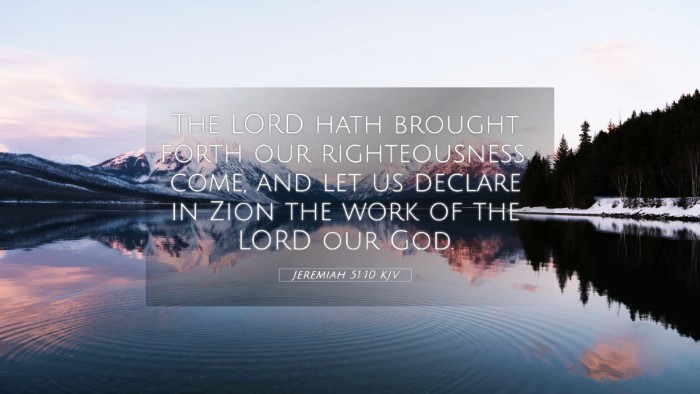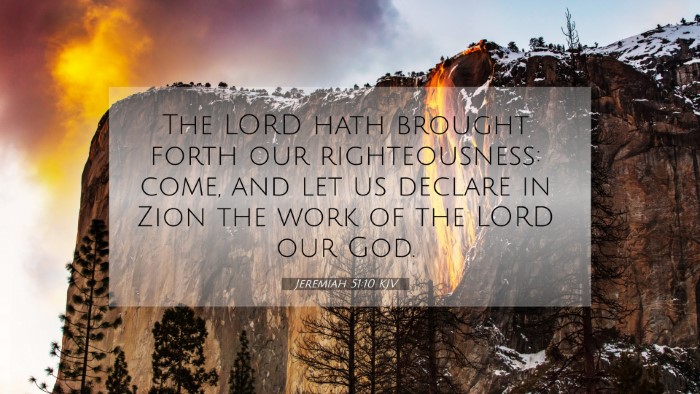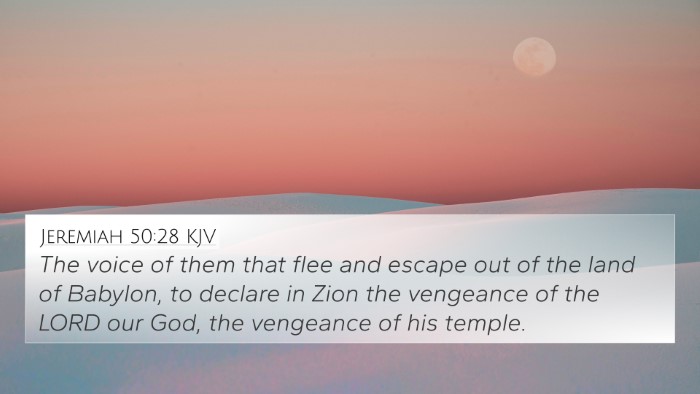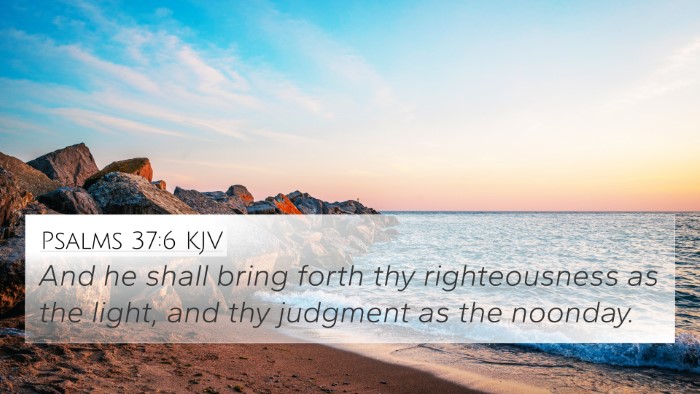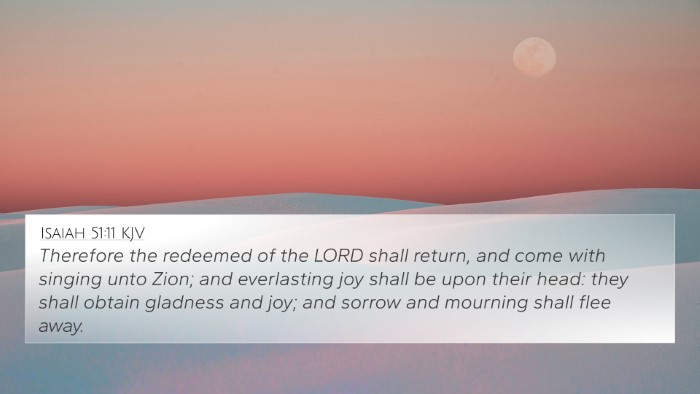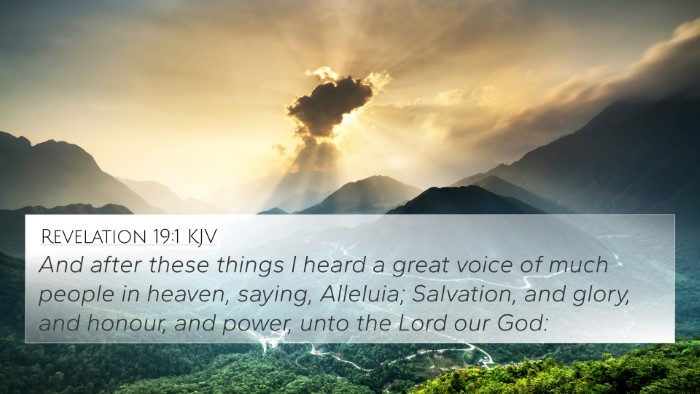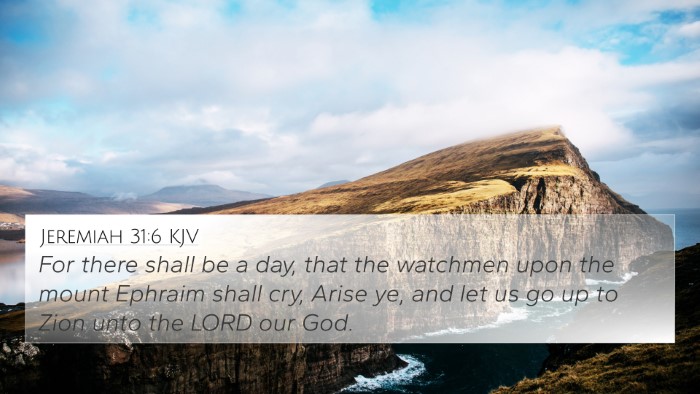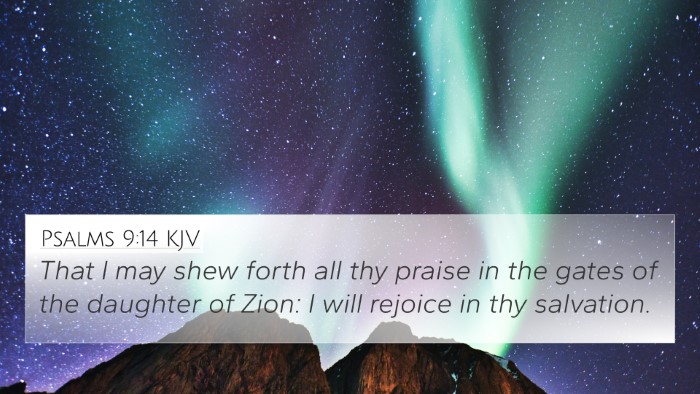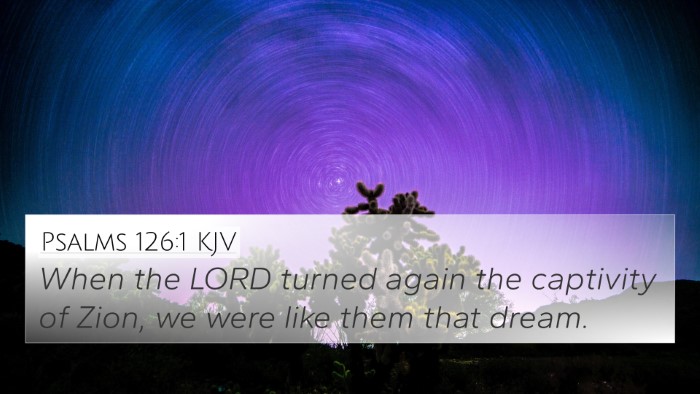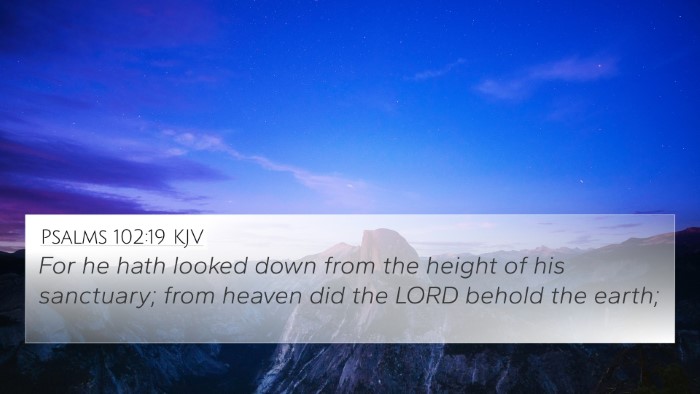Understanding Jeremiah 51:10
Jeremiah 51:10 states: “The Lord hath brought forth our righteousness: come, and let us declare in Zion the work of the Lord our God.” This verse captures a moment of divine justice and deliverance, reflecting the broader themes of redemption and the sovereignty of God in the midst of judgment. Below is a detailed exploration of the verse's meaning, drawing insights from biblical commentaries.
Verse Analysis
This verse is a proclamation of the Lord's righteousness and a call to acknowledge His work. The phrase “the Lord hath brought forth our righteousness” suggests that God Himself is the source of righteousness for His people. This can be seen as an invitation to recognize that their standing before God is not self-made but is granted by Him.
Thematic Insights
- Divine Deliverance: The verse highlights God's role in delivering His people from oppression and evil.
- Invitation to Praise: It serves as a call to worship, encouraging the people to declare God's deeds in Zion, which signifies the place of His dwelling.
- Historical Context: This verse was spoken during a time when the Judahites were facing Babylonian captivity, emphasizing hope for vindication and restoration.
Commentary Insights
Matthew Henry comments on this verse emphasizing the importance of acknowledging God's righteousness in our lives. He states that it is essential to recognize God’s active role in our salvation and how His righteousness is a gift that allows believers to stand justified before Him.
Albert Barnes adds that this proclamation of righteousness connects deeply with the theme of God’s faithfulness. He notes that despite the sinfulness of the people, God's mercy brings forth righteousness and encourages them to declare His works in a spirit of thankfulness.
Adam Clarke further explores the implications of the phrase “let us declare in Zion.” He points out that Zion represents not only the physical location but also the spiritual status of the people of God, where they are to proclaim God's victories and faithfulness among themselves and to the world.
Cross-References
Jeremiah 51:10 has numerous connections with other biblical texts. Here are relevant Bible cross-references:
- Isaiah 46:13: “I bring near my righteousness; it is not far off, and my salvation will not delay.” This link emphasizes God’s commitment to delivering righteousness.
- Psalm 98:2: “The Lord has made known his salvation; he has revealed his righteousness in the sight of the nations.” This verse ties to the theme of declaring God’s works and righteousness.
- Romans 1:16-17: “For in it the righteousness of God is revealed from faith for faith.” This passage highlights how righteousness comes from God and is pivotal in the New Testament understanding of salvation.
- 2 Corinthians 5:21: “For our sake, he made him to be sin who knew no sin, so that in him we might become the righteousness of God.” This verse correlates with the theme of God granting righteousness to His people through Christ.
- Jeremiah 23:5: “Behold, the days are coming, declares the Lord, when I will raise up for David a righteous Branch.” This refers to the messianic prophecy linked to the righteousness of the Lord.
- Psalm 50:23: “The one who offers thanksgiving as his sacrifice glorifies me; to one who orders his way rightly I will show the salvation of God.” This verse connects the act of declaring God’s works with living righteously.
- Romans 3:22: “The righteousness of God through faith in Jesus Christ for all who believe.” This verse underscores the continuous theme of God's righteousness available to believers.
- Ephesians 2:8-9: “For by grace you have been saved through faith, and that not of yourselves; it is the gift of God.” This reflects God’s initiative in providing righteousness through grace.
- Isaiah 61:10: “I will greatly rejoice in the Lord; my soul shall exult in my God, for he has clothed me with the garments of salvation; he has covered me with the robe of righteousness.” This resonates deeply with the concept of God’s saving work and righteousness.
- Philippians 3:9: “And be found in him, not having a righteousness of my own that comes from the law, but that which comes through faith in Christ.” This connects the theme of righteousness through faith, akin to Jeremiah's proclamation.
Importance of Cross-Referencing
The practice of cross-referencing biblical texts is crucial for a deeper understanding of Scripture. It allows believers to see biblical themes interwoven throughout both the Old and New Testaments. Here’s why:
- Contextual Clarity: Identifying connections between Bible verses helps readers grasp the full meaning and context of specific passages.
- Thematic Understanding: Engaging with thematic Bible verse connections enriches one's spiritual insights and understanding of God’s plan.
- Enhanced Study Tools: Utilizing tools for Bible cross-referencing can enhance personal study and sermon preparation, providing a more comprehensive biblical perspective.
- Application of Scripture: Understanding interconnected verses helps believers apply biblical truths to their lives more effectively.
Conclusion
Jeremiah 51:10 serves as a powerful reminder of God's righteousness and faithfulness toward His people. Cross-referencing related verses enriches our understanding of this text, linking it to broader biblical themes of salvation, righteousness, and divine justice. As believers, we are encouraged to declare the works of the Lord and recognize His active role in our lives.

